Consulting Articles > Consulting Specializations > Types of Consulting: Common Career Paths and What They Involve
Consulting is one of the most dynamic career paths, but with so many types of consulting, strategy, operations, IT, HR, finance, and marketing, it can be difficult to know which specialization is right for you. From top firms like McKinsey, BCG, and Bain to boutique players in specific consulting fields, each path offers unique challenges, client needs, and long-term career opportunities. Whether you’re exploring different types of consultants to start your career or seeking clarity on the differences between strategy and operations consulting, this guide has you covered. In this article, we will explore the main consulting industries, what each involves, and how to choose the path that fits your goals.
If you need foundation clarity, read what is management consulting before exploring consulting types.
What Is Strategy Consulting in Consulting Careers?
Strategy consulting is one of the most prestigious and competitive fields in the consulting industry. If you've ever heard of top firms like McKinsey, BCG, or Bain, they are best known for their work in this area. Strategy consultants help businesses and organizations make high-level decisions that shape their long-term success.
What Do Strategy Consultants Do?
Strategy consultants work closely with senior executives to tackle big-picture challenges. Their work often involves:
- Market analysis – Researching industry trends, competitors, and customer behavior to identify opportunities.
- Business model evaluation – Assessing an organization’s current operations to determine areas for improvement.
- Growth strategies – Advising on expansion, acquisitions, or diversification strategies.
- Financial forecasting – Helping companies predict future revenue and profitability based on different strategic options.
Because strategy consulting involves high-stakes decisions, consultants in this field need strong analytical skills, problem-solving abilities, and industry expertise.
Who Hires Strategy Consultants?
Companies of all sizes turn to strategy consultants when they need expert guidance on major business moves. Common clients include:
- Large corporations planning mergers, acquisitions, or market expansions.
- Startups looking for strategic positioning and scalability.
- Government agencies needing economic policy recommendations.
- Nonprofits aiming to maximize impact with limited resources.
Is Strategy Consulting Right for You?
If you enjoy solving complex problems, working with top executives, and influencing big decisions, strategy consulting could be a great fit. However, it’s also known for being highly demanding, requiring long hours and deep industry research.
The next section will explore management consulting, which focuses on improving business efficiency and operations, a different but equally impactful career path.
What Is Management Consulting in Consulting Careers?
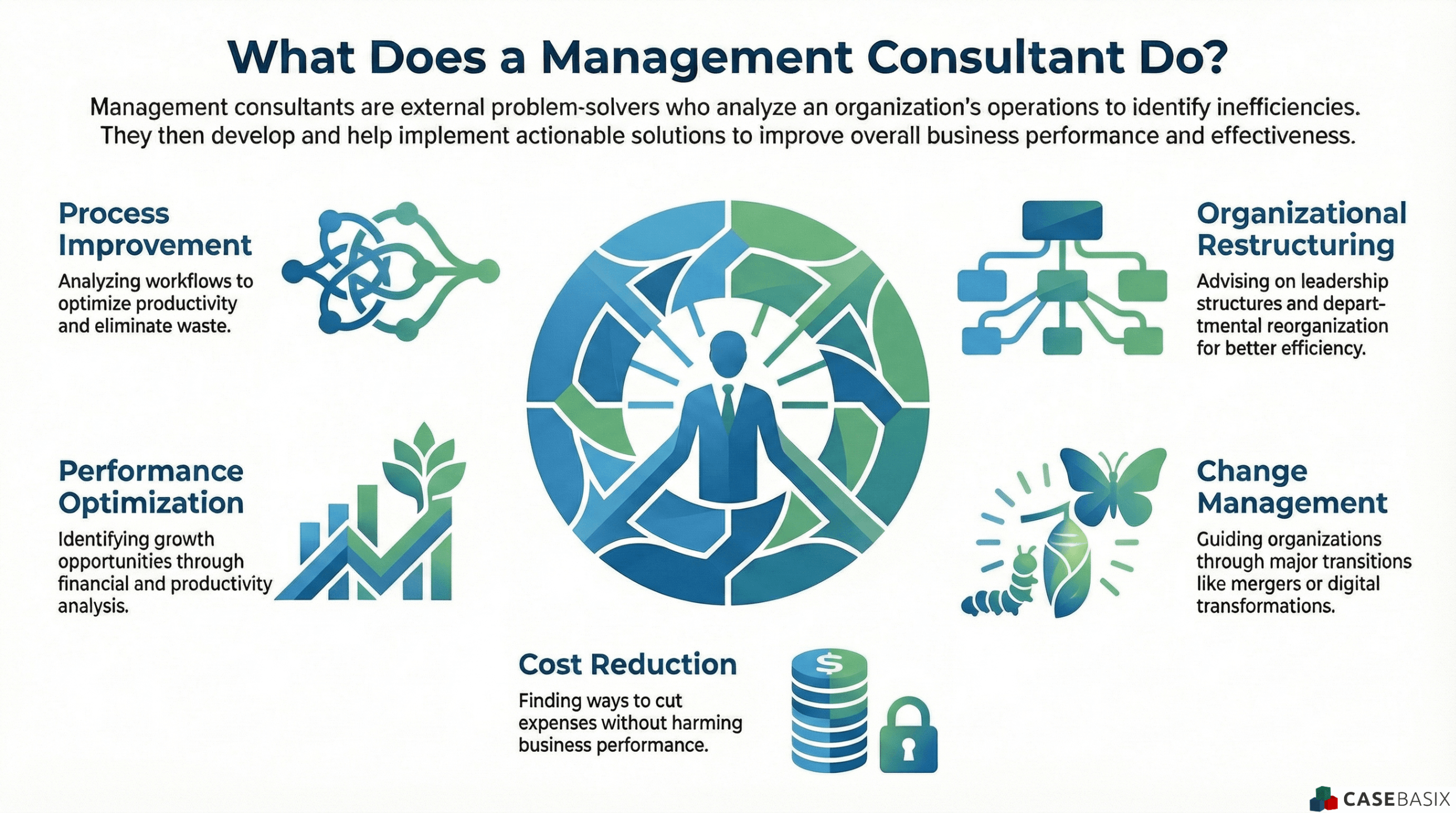
This infographic highlights the core responsibilities of management consultants across key areas that support business improvement.
Management consulting spans several functions that focus on improving how organizations operate and make decisions. This visual helps clarify the major areas where consultants create value, from analyzing processes to guiding organizational change. Understanding these responsibilities makes it easier to see how this consulting type differs from other fields.
While strategy consultants help businesses decide where they want to go, management consultants focus on how to get them there. They bridge the gap between high-level strategic planning and practical execution by working directly with organizations to improve efficiency, productivity, and profitability. Unlike strategy consulting, which emphasizes long-term vision, management consulting is more hands-on and implementation-driven, often requiring in-depth collaboration with internal teams.
What Do Management Consultants Do?
Management consultants are problem-solvers who assess an organization's operations, identify inefficiencies, and develop actionable solutions to improve performance. Their responsibilities vary widely but typically include:
- Process improvement – Analyzing workflows, identifying bottlenecks, and implementing strategies to optimize productivity and reduce waste.
- Organizational restructuring – Advising companies on leadership structure, departmental reorganization, and workforce efficiency to improve overall effectiveness.
- Performance optimization – Conducting financial analysis, employee productivity assessments, and customer experience evaluations to identify areas for growth.
- Change management – Helping organizations adapt to significant transitions such as mergers, acquisitions, leadership shifts, or digital transformation initiatives.
- Cost reduction strategies – Finding ways to cut unnecessary expenses while maintaining or improving business performance.
Management consultants often work on a project basis, engaging with clients for weeks or months at a time to implement and oversee changes. Their work requires strong analytical skills, interpersonal abilities, and adaptability, as they often navigate resistance to change within organizations.
Who Hires Management Consultants?
Because management consulting focuses on improving internal business operations, it is highly sought after across a variety of industries. Some of the most common clients include:
- Large corporations facing declining profits or operational inefficiencies that need expert intervention.
- Companies undergoing mergers or acquisitions that require seamless integration of teams, systems, and processes.
- Fast-growing startups looking to implement scalable business processes and avoid inefficiencies as they expand.
- Government agencies seeking to enhance public service delivery, optimize budgets, and increase transparency.
- Healthcare organizations working to improve patient care, streamline operations, and navigate regulatory changes.
Is Management Consulting Right for You?
Management consulting could be a great fit if you:
- Enjoy solving real-world business problems and seeing tangible results.
- Prefer a structured, data-driven approach to decision-making.
- Have strong analytical and problem-solving skills that allow you to break down complex business challenges.
- Thrive in fast-paced environments where no two projects are the same.
- Are comfortable with working closely with teams and leaders to implement changes.
While the work is rewarding, management consulting can also be demanding. Consultants often work long hours, travel frequently, and need to juggle multiple projects at once. However, for those who enjoy variety, problem-solving, and making a measurable impact on businesses, it offers an exciting and fulfilling career path.
Next, we’ll explore operations consulting, which specializes in refining specific business functions such as supply chain, logistics, and production efficiency.
What Is Operations Consulting in Consulting Careers?
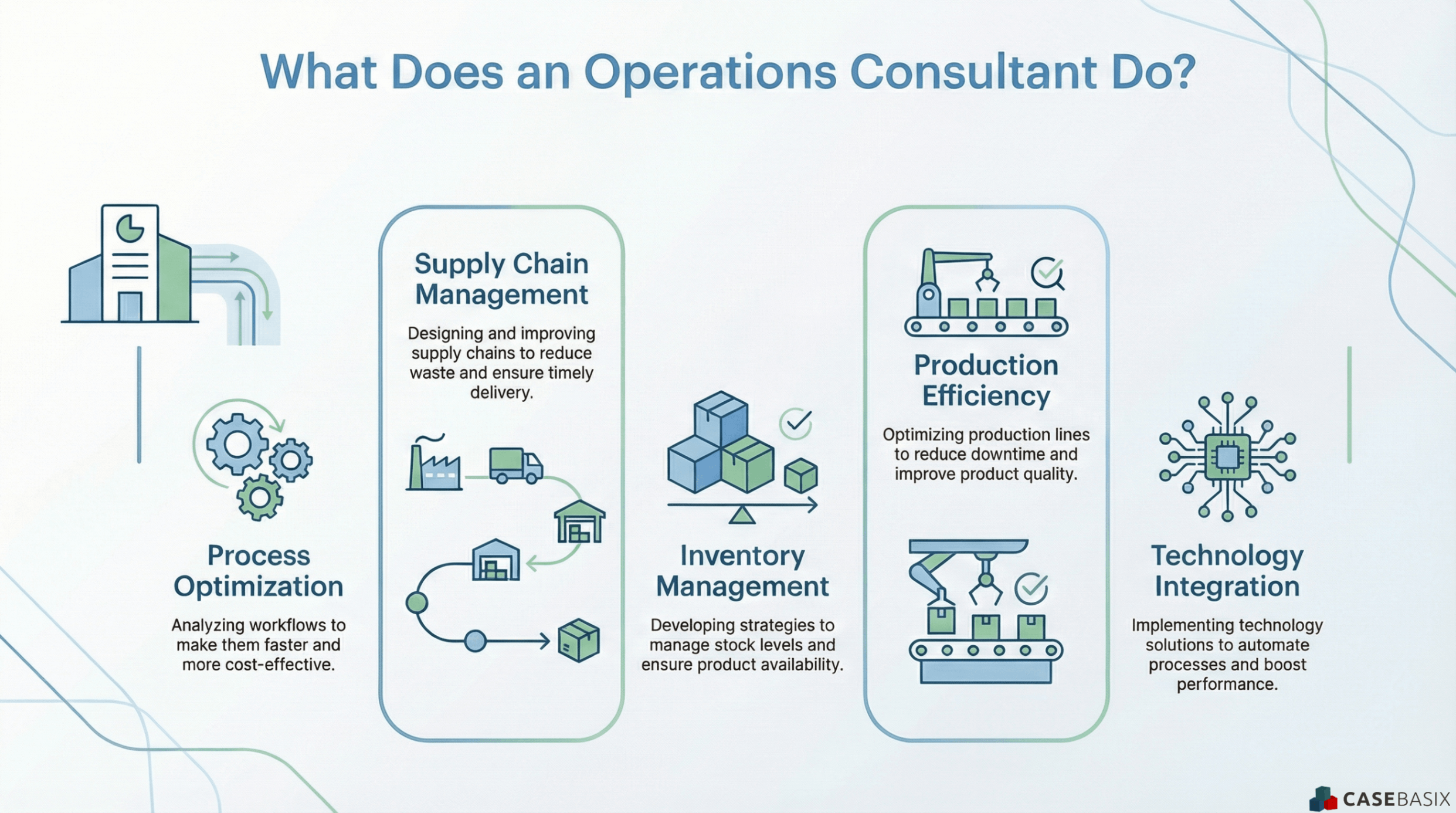
This infographic summarizes the core responsibilities of operations consultants and how they improve efficiency across key business functions.
Operations consulting focuses on improving the systems that keep a business running smoothly. This visual highlights the areas where consultants create measurable impact including supply chain design process optimization and technology integration. Understanding these responsibilities helps clarify how operations consulting differs from broader management or strategy roles.
If you're someone who thrives in optimizing systems and processes to create tangible improvements, operations consulting may be a perfect fit. While strategy and management consultants focus on broader business goals, operations consultants dig into the nuts and bolts of day-to-day business functions. Their main job is to help companies streamline their operations, improve efficiency, and reduce costs.
What Do Operations Consultants Do?
Operations consultants focus on the inner workings of a business; how things are done on a daily basis. Their role typically includes:
- Process optimization – Analyzing business workflows to identify inefficiencies and implementing solutions to make processes faster and more cost-effective.
- Supply chain management – Helping companies design, manage, and improve supply chains to reduce waste and ensure timely delivery of goods and services.
- Inventory management – Developing strategies to better manage stock levels, reduce excess inventory, and ensure products are readily available when needed.
- Production efficiency – Working with manufacturing teams to optimize production lines, reduce downtime, and improve product quality.
- Technology integration – Recommending and implementing technology solutions that automate processes and enhance operational performance.
Operations consultants often collaborate closely with internal teams, analyzing data, conducting audits, and designing practical solutions. Their goal is to make operations more streamlined, efficient, and sustainable, all while driving cost reductions and maximizing the company's output.
Who Hires Operations Consultants?
Organizations across industries turn to operations consultants when they need to improve the efficiency of their business functions. Common clients include:
- Manufacturers looking to optimize production processes and increase output.
- Retail companies seeking better inventory management to meet demand while reducing waste.
- Logistics companies working to improve their delivery networks and reduce transportation costs.
- Tech firms integrating advanced technologies to automate operations and scale quickly.
- Healthcare providers aiming to streamline patient care processes and reduce costs without sacrificing quality.
Is Operations Consulting Right for You?
Operations consulting is ideal if you:
- Have a keen eye for detail and enjoy solving practical, operational challenges.
- Are comfortable working with data and using it to make decisions.
- Enjoy collaborating with different teams and finding solutions that work across various functions.
- Are interested in making real, measurable impacts on business efficiency and profitability.
Operations consulting can be highly rewarding but also challenging. It requires a strong understanding of both the big picture and the finer details, making it a great career path for those who enjoy a balance of strategic thinking and hands-on problem-solving.
Next, we’ll explore financial advisory consulting, which focuses on guiding businesses through complex financial decisions and strategies.
What Is Financial Advisory Consulting in Consulting Fields?
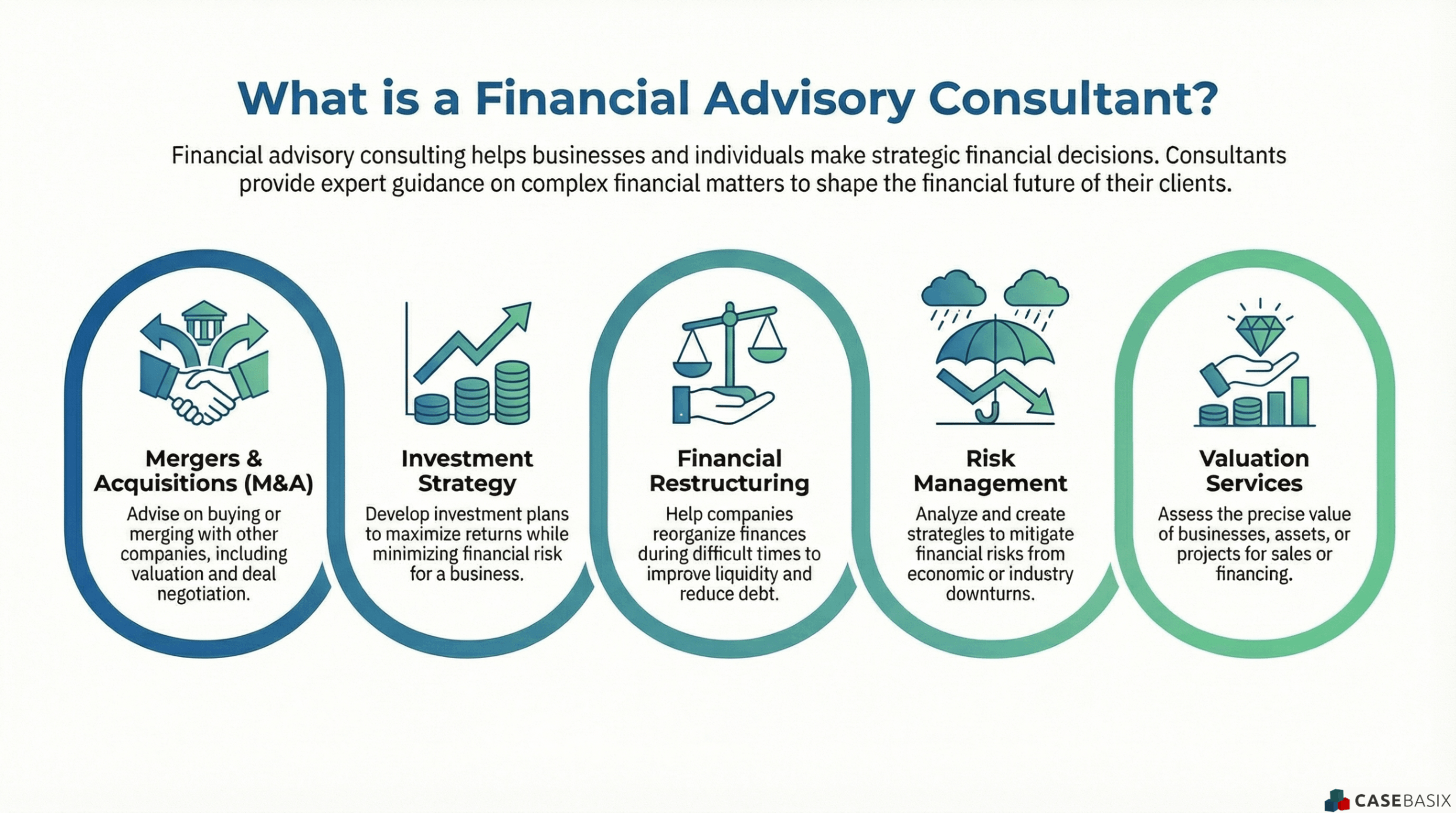
This infographic outlines the main responsibilities of financial advisory consultants and how they guide organizations through complex financial decisions.
Financial advisory consulting covers areas that help organizations navigate high-stakes financial decisions with clarity and precision. This infographic highlights essential services such as valuation, investment planning, and restructuring to show how consultants support stability and long-term growth. Understanding these responsibilities makes it easier to distinguish financial advisory work from other consulting fields.
Financial advisory consulting is all about helping businesses and individuals make informed financial decisions. Whether it’s guiding a company through a merger, advising on investment strategies, or ensuring the financial health of a business, financial advisory consultants bring expertise that shapes the financial future of organizations. If you have a strong background in finance, enjoy problem-solving, and thrive on navigating complex financial landscapes, this could be an ideal career path for you.
What Do Financial Advisory Consultants Do?
Financial advisory consultants focus on helping businesses make strategic financial decisions. Their responsibilities can vary depending on the client, but typically include:
- Mergers and acquisitions (M&A) – Advising companies on buying or merging with other businesses, including assessing the value of target companies and helping negotiate the deal.
- Investment strategy – Assisting businesses in developing investment plans that maximize returns while minimizing risk, often including portfolio management and asset allocation.
- Financial restructuring – Helping companies reorganize their finances, often during difficult times, to improve liquidity, reduce debt, or improve capital efficiency.
- Risk management – Analyzing financial risks and advising on strategies to mitigate them, ensuring that the business can weather economic downturns or industry-specific risks.
- Valuation services – Assessing the value of businesses, assets, or projects, often for the purpose of sale, mergers, or obtaining financing.
Financial advisory consultants require deep financial expertise, strong analytical skills, and the ability to communicate complex financial information clearly to clients. They often work with senior leadership and other professionals like lawyers and accountants to ensure that financial decisions align with the company’s long-term goals.
Who Hires Financial Advisory Consultants?
Financial advisory consultants are often brought in when a company faces complex financial decisions or challenges. Some of the most common clients include:
- Corporations looking to expand through mergers or acquisitions or restructure their finances.
- Private equity firms seeking advice on investments and acquisitions.
- Startups needing help with fundraising, financial planning, and valuations.
- Nonprofits requiring assistance with managing their funds, budgeting, or financial compliance.
- Governments seeking to improve the efficiency of public spending or manage public debt.
Is Financial Advisory Consulting Right for You?
If you enjoy working with numbers, analyzing data, and advising on high-stakes financial decisions, financial advisory consulting may be a great fit. It requires strong quantitative skills, a deep understanding of financial markets, and the ability to make complex financial concepts accessible to clients.
The work can be highly rewarding, especially for those who enjoy challenges and thrive under pressure. However, it is also demanding, often requiring long hours and attention to detail, particularly during high-stakes projects like mergers or financial restructurings.
Next, we’ll explore IT consulting, which focuses on guiding companies through technological changes and improving IT systems to drive business success.
What Is IT Consulting in Consulting Fields?
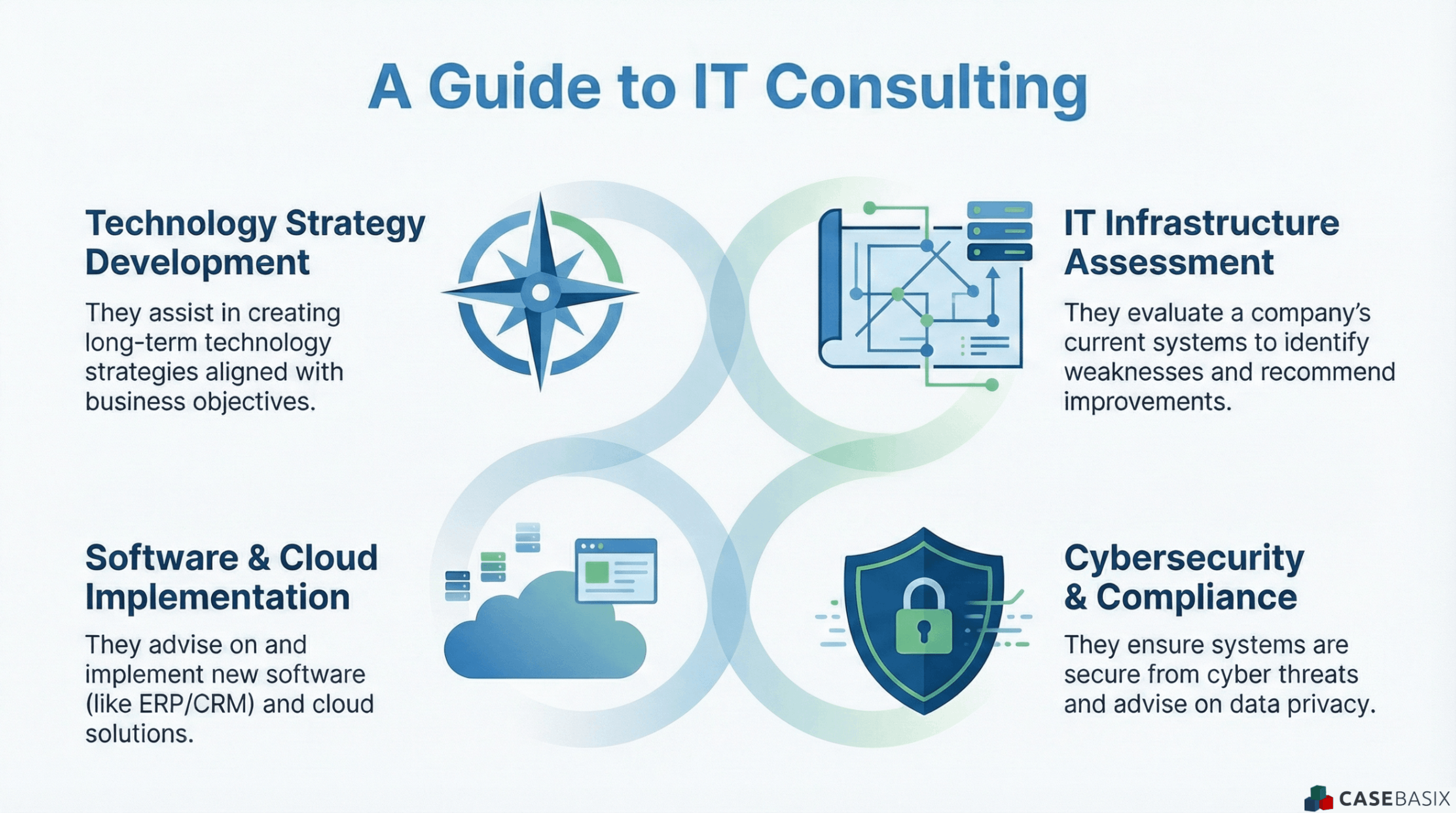
This infographic highlights the core responsibilities of IT consultants and how they guide organizations through technology strategy and system improvements.
IT consulting plays a central role in helping organizations strengthen their technology capabilities and stay competitive. This visual breaks down the major responsibilities from assessing infrastructure to implementing secure cloud solutions. It provides a clear snapshot of how IT consultants support digital transformation across industries.
In today’s digital world, technology plays a crucial role in the success of nearly every business. IT consultants specialize in guiding companies through technological changes, helping them optimize their IT infrastructure, implement new software, and ensure that their systems support their business goals. If you have a knack for technology and enjoy solving complex problems, IT consulting could be the perfect career for you.
What Do IT Consultants Do?
IT consultants help organizations improve their use of technology to achieve business objectives. They often work with both the IT department and company leadership to ensure that technology solutions align with strategic goals. Typical responsibilities include:
- IT infrastructure assessment – Evaluating a company’s current IT systems, identifying weaknesses, and recommending improvements.
- Software implementation – Advising on and implementing new software systems that support operations, such as enterprise resource planning (ERP) software or customer relationship management (CRM) tools.
- Cybersecurity – Ensuring that a company's systems are secure and protected from cyber threats, while also advising on best practices for data privacy and compliance.
- Cloud computing – Helping companies transition to cloud-based solutions that offer greater flexibility, scalability, and cost savings.
- Technology strategy development – Assisting with the development of a long-term technology strategy that aligns with the business’s objectives and market trends.
IT consultants are problem-solvers, constantly staying ahead of technological trends to provide clients with solutions that are innovative and future-proof. They often work closely with different departments and communicate complex technical concepts to non-technical stakeholders.
Who Hires IT Consultants?
In an era where technology drives nearly every aspect of business, IT consultants are in high demand across industries. Common clients include:
- Large corporations seeking to optimize their technology infrastructure and improve efficiency.
- Startups needing help implementing scalable tech solutions from the ground up.
- Healthcare organizations that need help with electronic health records (EHR) systems or cybersecurity.
- Retailers looking to implement e-commerce platforms and improve their IT systems to handle increasing online demand.
- Financial institutions that require secure, reliable systems for managing sensitive customer data and transactions.
Is IT Consulting Right for You?
IT consulting may be right for you if you:
- Have a strong understanding of technology and enjoy solving complex IT problems.
- Are comfortable working with a wide range of clients and learning about their specific technology needs.
- Enjoy being at the forefront of innovation, continuously learning about new tech trends and solutions.
- Are able to translate complex technical concepts into easy-to-understand terms for business leaders and stakeholders.
While IT consulting can be highly rewarding, it requires a deep technical knowledge and the ability to adapt to rapidly changing technology landscapes. It also requires the ability to work under pressure, as technology solutions often need to be implemented quickly to keep up with business demands.
Next, we’ll explore Human Resources (HR) Consulting, which focuses on optimizing workforce management, talent acquisition, and employee satisfaction to support organizational success.
What Is HR Consulting in Consulting Fields?
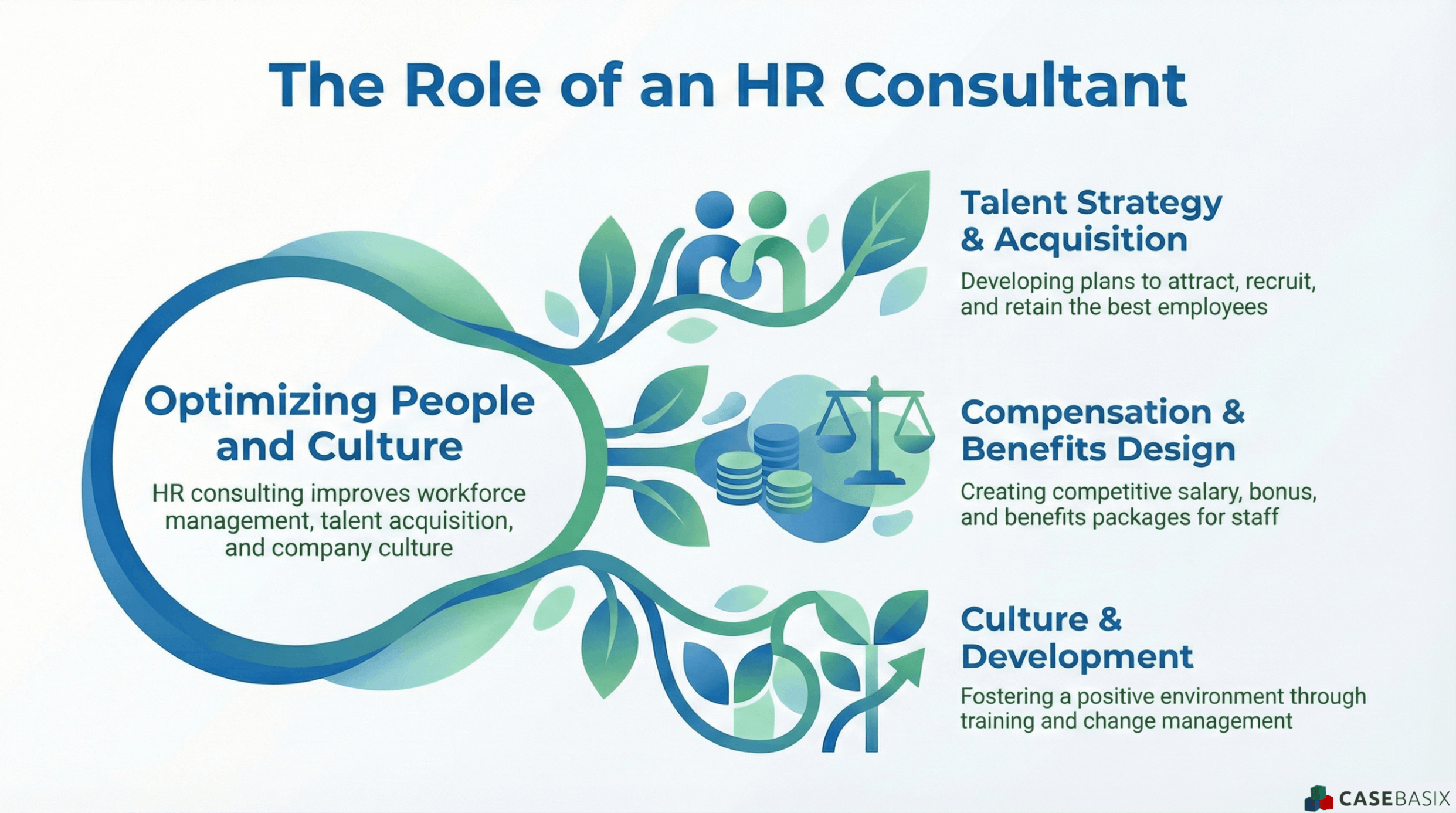
This infographic shows how HR consultants strengthen organizations through talent strategy compensation planning and culture development.
HR consulting focuses on strengthening the people side of an organization to improve performance and long term success. This visual highlights key areas such as talent acquisition, compensation planning, and culture development to show how HR consultants create meaningful organizational impact. Understanding these responsibilities clarifies how this field differs from operational or strategic consulting paths.
Human Resources (HR) consulting is all about optimizing the most important asset of any organization, its people. HR consultants specialize in improving workforce management, talent acquisition, employee engagement, and organizational culture. They help businesses create strategies that attract, develop, and retain top talent, while also ensuring that the company’s HR policies align with its overall goals. If you’re passionate about working with people, creating positive workplace cultures, and solving challenges related to talent management, HR consulting might be the right career path for you.
What Do HR Consultants Do?
HR consultants assist companies in creating and maintaining effective HR practices that contribute to overall organizational success. Their responsibilities often include:
- Talent acquisition and recruitment – Helping businesses develop strategies to attract the best candidates, from crafting job descriptions to improving interview processes.
- Employee engagement and retention – Advising on programs and policies that improve employee satisfaction, performance, and retention rates.
- Compensation and benefits – Designing competitive compensation packages, including salaries, bonuses, benefits, and other perks to attract and retain top talent.
- Training and development – Developing training programs that enhance employee skills, leadership capabilities, and career growth.
- Organizational culture and change management – Helping companies navigate organizational changes, improve workplace culture, and implement policies that foster a positive environment.
HR consultants typically work closely with senior management and HR departments to assess the company’s current practices and develop tailored solutions that align with the organization’s goals and culture.
Who Hires HR Consultants?
HR consultants are hired by organizations looking to optimize their people-related processes. They work with businesses of all sizes across a variety of industries. Common clients include:
- Large corporations seeking to improve or restructure their HR departments to better align with business goals.
- Startups looking to develop efficient HR processes and company cultures as they scale.
- Nonprofits requiring assistance in talent acquisition, employee engagement, and retention strategies.
- Government agencies aiming to optimize their recruitment processes and improve employee performance.
- Healthcare organizations needing support with workforce management, compliance, and training for healthcare professionals.
Is HR Consulting Right for You?
HR consulting could be the perfect career if you:
- Enjoy working with people and have a strong understanding of what motivates employees.
- Have excellent communication skills and can guide businesses in developing policies that enhance employee experience and productivity.
- Are passionate about creating a positive work culture and improving overall organizational efficiency.
- Want to make a tangible impact on the success of an organization by optimizing its most valuable resource, its people.
While HR consulting is highly rewarding, it can also be challenging. It requires deep knowledge of employment laws, industry best practices, and the ability to navigate complex interpersonal dynamics within organizations. However, for those who enjoy people management and helping organizations thrive, HR consulting offers an exciting and fulfilling career.
Next, we’ll explore marketing consulting, which focuses on helping businesses improve their marketing strategies, brand presence, and customer outreach.
How Do You Choose the Right Consulting Career Path?
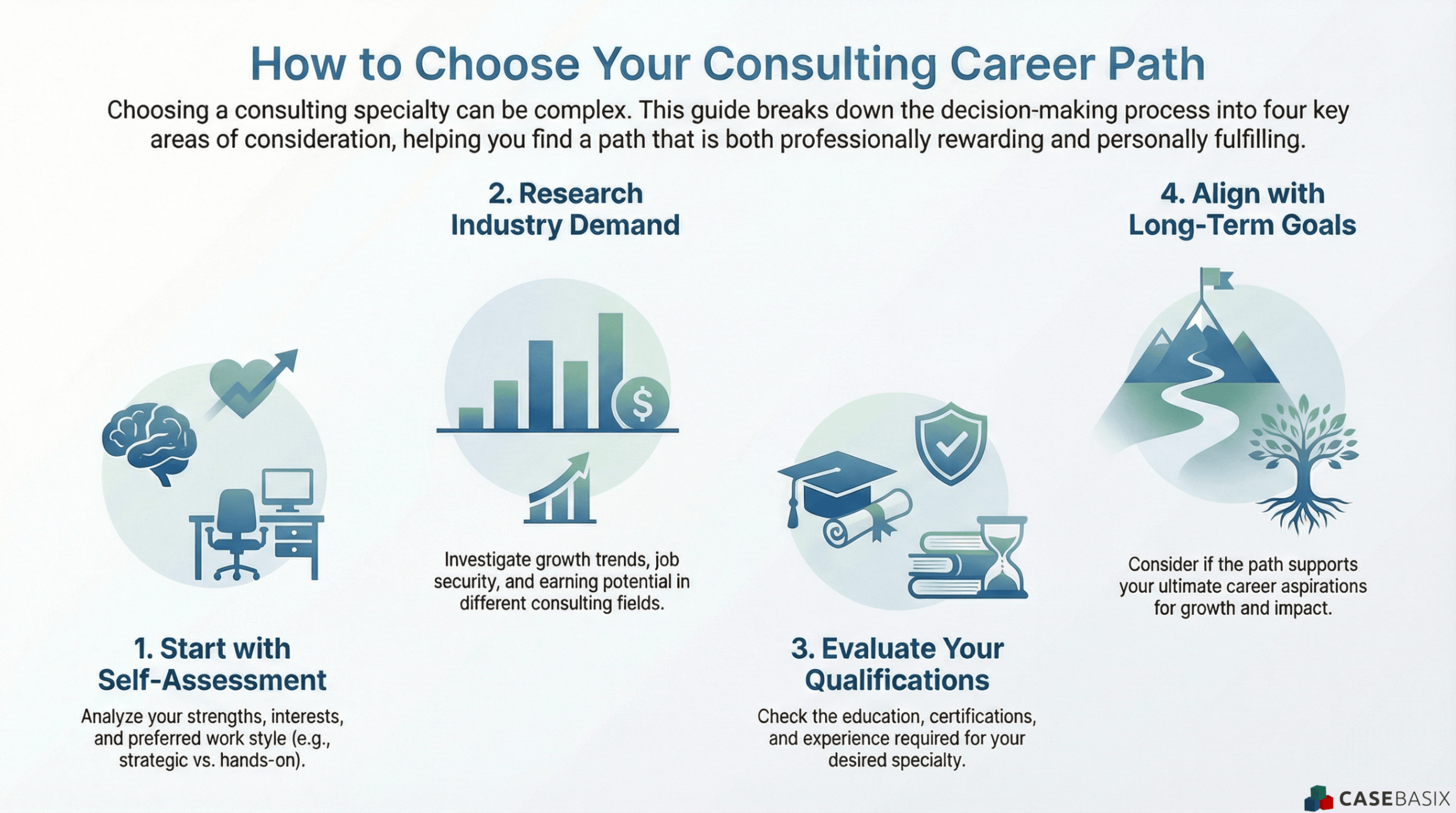
This infographic breaks down the key steps to choosing a consulting career path by evaluating strengths industry demand qualifications and long term goals.
Choosing a consulting specialty becomes clearer when you understand the factors that shape long term career fit. This visual highlights the main steps from assessing strengths to researching industry trends and evaluating qualifications. It helps readers reflect on how each consideration aligns with their goals and preferences.
Selecting the right consulting path can feel overwhelming given the variety of specialties available, from strategy and operations to HR and IT. However, understanding your skills, interests, and long-term goals will help you determine which consulting field is the best fit. Choosing the right path is not only about what you’re good at but also what excites you and where you see yourself making an impact.
Self-Assessment: What Are Your Strengths and Interests?
The first step in choosing the right consulting path is understanding your strengths and interests. Ask yourself questions like:
- Do you enjoy problem-solving and working on high-level strategies, or do you prefer hands-on work in specific operational areas?
- Are you passionate about working with people, like in HR consulting, or do you prefer focusing on technology solutions or financial decisions?
- Do you thrive in fast-paced environments, or are you more drawn to working on longer-term projects with bigger, strategic goals?
Identifying your core competencies and passions will help you narrow down which consulting path is most likely to keep you engaged and fulfilled. For example, if you love working with technology and enjoy staying ahead of digital trends, IT consulting could be a natural fit. If you excel at analyzing complex data and providing financial solutions, financial advisory consulting might be more your style.
Consider Industry Demand and Growth Opportunities
Another important factor to consider is the industry demand and growth potential for each consulting path. Some consulting fields, such as IT consulting, have seen significant growth due to the ongoing digital transformation of businesses. On the other hand, management consulting and strategy consulting continue to be highly sought after by large corporations and organizations looking to innovate and stay competitive.
Do some research into the job market and growth trends within each consulting field. Certain sectors may offer more job security, higher earning potential, and more career advancement opportunities based on the current economic climate.
Education and Experience Requirements
Each consulting field has different education and experience requirements. For example, strategy consultants often require advanced degrees like an MBA and experience in corporate strategy, while operations consultants might need a background in industrial engineering or supply chain management. Similarly, HR consultants may have backgrounds in psychology or human resource management, while financial advisors typically come from finance or accounting backgrounds.
It’s important to assess your educational background and whether additional qualifications, certifications, or experience are required to transition into a particular consulting field.
Will the Path Align With Your Career Goals?
Finally, think about your long-term career goals and whether a particular consulting field aligns with them. For example, if you want to climb the corporate ladder and eventually work in top management, strategy consulting might offer the best opportunities for upward mobility. On the other hand, if you’re passionate about creating systems and efficiency, operations or IT consulting could allow you to have a significant impact on business success while still providing opportunities for growth.
Ultimately, choosing the right consulting path is a personal decision that will be shaped by a combination of your skills, passions, market trends, and long-term goals. It’s important to consider both the professional and personal rewards of each path to ensure that it’s a fulfilling career choice.
Frequently Asked Questions
Q: What are the main types of consulting?
A: The main types of consulting include management consulting, strategy consulting, operations consulting, IT consulting, human resources consulting, financial advisory consulting, and marketing consulting. These different types of consulting services help businesses improve performance, solve problems, and drive growth.
Q: How do I choose the right consulting career path?
A: To choose the right consulting career path, assess your skills, interests, and industry knowledge. Ask yourself, "Which consulting career path is right for me?" and explore fields like IT, strategy, or HR to find the best fit.
Q: What does a strategy consultant do?
A: A strategy consultant helps businesses develop long-term plans and competitive strategies to achieve their goals. Strategy consulting is a popular consulting service focused on high-level decision-making and business growth.
Q: Are there benefits to specializing in a type of consulting?
A: Yes, there are many benefits of specializing in a type of consulting, such as gaining deeper expertise, higher earning potential, and clearer career progression. Specializing helps you stand out in competitive consulting career paths.
Q: What’s the difference between management consulting and operations consulting?
A: The difference between management consulting and operations consulting is that management consulting focuses on overall business strategy and leadership, while operations consulting improves day-to-day processes and efficiency. Both are valuable types of consulting depending on client needs.




